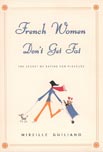Culture
The pleasure principle
Croissants, chocolate and champagne, oh my! Read on to discover why French women are starting a food revolution.
by : Lara ceroni- Aug 15th, 2005

It is a girl’s best diet fantasy — skip the gym, ignore the low-cal, low-fat aisles at the grocery store and eat, eat, eat. Snack on chocolate, sip champagne and indulge in those flaky, buttery pastries. The catch? Promised weight loss. Well, at least that is what Mireille Guiliano, author of the best selling book, French Women Don’t Get Fat (Knopf Publishing, 2005) proposes. Considering that only 11 percent of French people are obese compared to 30 percent of Americans who are 30 pounds heavier than a healthy weight, she just might be on to something.
ELLE Canada sat down with the ever-so-chic and, I daresay, very slim, Guiliano to get the skinny on eating for pleasure, one truffle at a time.
EC: Where did you derive your inspiration from in writing this book?
MG: As a teenager, I went to Massachusetts in America as an exchange student. The food there was very different than what I was accustomed to. In America, they had chocolate chip cookies and brownies like I had never seen. In France, you have ice cream only in the summer months, but in America, you could get it all year round. So I started eating all of the time. With my host family, we’d eat in the car, in front of the T.V, everywhere. It became a vicious circle and one that was very hard to stop. At the end of my time in America as a student, I had gained 20 pounds. When I finally came back to France, my father told me that I looked like a sack of potatoes. I was devestated. Through the course of my tribulation, I met my family physician, whom I now refer to as “Dr. Miracle” who re-introduced me to the French principles of eating. And thus, I lost the weight and began to return to my normal self.
I never really thought I would write anything about diets. With my job in America, I lecture quite a bit on food and wine and women would always come up to me and say, “You’re so passionate about food and wine and we always read pieces on you entertaining and dining in New York and Paris. How do you not gain weight?” I would always say that us French have our secrets and one day, someone suggested I write a book about that. The rest, as they say, is history.
EC: At the beginning of your book, you mention that one thing peeople should learn is to be a bit narcissistic while also being a bit hedonistic. What does that mean?
MG: We all have two ‘personalities’ inside ourselves. One wants to be healthy, slim, beautiful, in ‘fashion’, while the other side wants to have it all, to live in excess, to indulge every and all pleasures. You have to understand and appreciate that you have both sides. To eliminate one ‘personality’ is to diet, and we don’t want that. Everything is a matter of balance. In other words, you can have your cake and eat it too, just not the whole thing! If I do eat everything, I’ll get fat again. I’ve been there, done that. I was not happy when I was over-weight, no one is. It will reflect on everything else in your life — your professional life, your personality, everything. The key is moderation. It’s that simple.
EC: You make alot of reference to how we in North America are a diet-obsessed culture. We consumer ourselves with the no carbs, high protein, no fat diets and ultimately they fail. Why do you think that is?
MG: Deprivation. When you deprive yourself of certain things, you’re eventually going to take revenge on yourself and binge. Diets are deprivation. They are boring and very stressful as more often than not, you are restricted to only a certain type of food and therefore, one type of nutrient.
EC: So there are many more repercussions to going on these types of diets, other than just trying to lose weight. Health-wise, it can be dangerous?
MG:Yes, absolutely. My book has the approach that, “yes, you can have your chocolate, you can have your bread”, but you have to learn how to pare it down. We typically eat 10-30 percent more food than what we need on a daily basis. By keeping a food journal, as I suggest, you can ascertain whether you’re over what you should be. Then, you start to reduce your intake gradually. Instead of eating four pieces of bread at dinner, before your meal, stick to one. It’s a different kind of awareness.
EC: How have we lost the pleasure of eating?
MG: We live in an age of convenience. There is such an abundance of food and a variety of food nowadays. The temptations to snack on fast-foods is great. Stress also plays a very important role. We are constantly pulled in different directions and when we don’t have the time and we’re hungry, we’ll grab whatever is closest to us. I was at the airport and I was watching all of these people, waiting for their flights, on their cell phones, on their laptops, all eating hamburgers, pizzas, fries, like it was their last meal. I asked myself, ‘I wonder if I can find one person who’s having pleasure eating?’ I couldn’t find anyone. You can get stuck in this cycle and it is not good for you.
Q: In the book, there is a lot of discussion about “compensation” as one of the rules of eating properly. Can you please expand on that?
G:It’s all about balance. If you over-indulge at one meal, then you compensate by having a much lighter meal later on. You compromise. The American woman wants to avoid all the foods she typically thinks are bad for her. She’ll be at dinner and say, “Oh, I can’t eat that piece of bread, I can’t have that pasta or that piece of cake. It’s too sinful.” But then, she’ll go home after dinner and binge because she’s completely deprived herself of all of it. No, that’s not the way to do it. First of all, that’s a very boring way to live life. And secondly, enjoy those foods, just don’t eat the entire plate. Savour it, take your time with it. One night I was out for dinner and we had a couple of glasses of champagne, oysters, salmon, desert. It was much larger portions that what we’d typically eat. Well, guess what? The next morning I’m not going to have a croissant for breakfast, I’ll opt for a yoghurt instead. You make up for your bigger indulgences, but compensating over the next meal. Big lunch? Have a smaller dinner, a soup and a salad with a piece of cheese, something like that.
Q: You stress how wise it is to eat fruits and vegetables only when in season. What are the benefits?
G: Nothing is worse than eating a piece of fruit or a vegetable that tastes like cardboard. Tomatoes, in the wintertime, are not in season and should therefore, not really be eaten. Adapt your eating to what is available at your market for that specific month of the year. This, known as seasonality, is key to the French women’s idea of eating as such change is an absolute must in our eating rituals. Mindless eating promotes boredom and weight gain. Though the markets in North America are not quite like they are in Europe, specialty stores and food markets are opening up at a rapid pace. You must take the time to find them. In the end, it’s well worth it. Variety is the spice of life.
Q: What are some of the biggest differences in North American women’s views on body image, dieting, staying healthy, compared to the French?
G: Without trying to over-generalize, here are some of the differences I’ve noted in my experiences:
French women typically think about good things to eat whereas North American women typically worry about bad things to eat.
French women love bread and would never consider a life without carbs.
French women don’t eat anything artificial or stripped of natural flavour. They go for the real thing in moderation.
French women do stray, we all do, but they always come back, believing there are only detours and no dead ends.
French women do enjoy wine regularly, but with meals and only a glass or two.
French women eat for pleasure.
French women don’t diet.
French women don’t get fat.
Bon appétit!
Newsletter
Join our mailing list for the latest and biggest in fashion trends, beauty, culture and celebrity.
Read Next

Fashion
Are Fashion Brands Getting Greener?
While the fashion industry is making a lot of noise about being more sustainable, a closer look shows that its earth-friendly commitments are often more illusion than reality.
by : Marouchka Franjulien- Apr 19th, 2024

Beauty
What Beauty Packaging Is Actually Sustainable?
We sought out leaders in the field to help us get to the bottom of the blue bin once and for all.
by : Victoria Christie- Apr 19th, 2024

Culture
Discover Club Med’s Stunning Exclusive Collection
Vacation destinations that bring pure luxury and comfort.
by : ELLE Canada- Apr 8th, 2024




